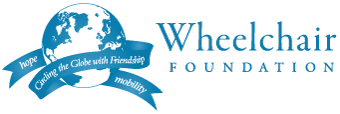As Staff Sgt. Heath Calhoun wheels his chair up and down the basketball court, it’s clear he enjoys a good game of hoops – and working up a sweat.
Although this is the first time he has played basketball from a seated position, it doesn’t take him long to get into the mix. After a little instruction from some experienced wheelchair basketball players, Calhoun is soon maneuvering in front of an opponent, pulling down a pass and then swiftly dribbling the ball upcourt.
Calhoun’s wife, Tiffany, and son, Mason, 23 months, cheer him on.
Like the dozen or so other amputee patients participating in the wheelchair basketball clinic here at Walter Reed Medical Center, Calhoun, was wounded in Iraq. A member of the U.S.Army’s 101st Airborne, he lost both legs in a Nov. 7 in Mosul.
At Walter Reed for the past six months, Calhoun, 24, has undergone therapy, rehabilitation and instruction in using a pair of high-tech titanium prosthetic legs with hydraulic knees. As he grows stronger and more confident with the devices, Calhoun says he looks forward to walking unassisted with Mason and playing ball together.
Supporters and organizers of the basketball clinic, which is sponsored by the U.S. Olympic Committee (USOC), its Paralympics Division and the Wheelchair Foundation, want Calhoun to get ready for that father-son game and any other activity he can imagine.
“Sports allow you to test yourself, to challenge yourself, to work with others and better understand your disability. But most importantly, it helps you learn what your abilities are,” Gordon Mansfield, deputy secretary of Veterans Affairs, told Calhoun and the other participants and their families at the clinic in March, the first of several scheduled at Walter Reed. The next is set for June 8.
The journey after a disabling injury is tough, Mansfield says, but it needn’t be traveled alone.
An outreach effort spearheaded by U.S. Paralympics is trying to make sure that returning soldiers with physical disabilities get connected with sports and fitness programs in their communities.
“When they leave here, we don’t want them to feel all alone,” says Cheryl Barnes, executive director of the Wheelchair Foundation’s chapter in Washington, D.C. “We want to plug them in, keep them active.”
Says John Register, a Gulf War veteran, two-time Paralympic Games athlete and manager of the Paralympic Academy: “The programs are out there, but too few people know they’re there.” The academy is a USOC national program that focuses on getting children with physical disabilities to participate in sports and recreational activities.
Calhoun was among a group of recovering soldiers from Walter Reed who in early March traveled to Vail, Colo., for a ski program sponsored by Disabled Sports USA.
Snowboarg for the first time was “a blast” falls and all, Calhoun says. Like playing wheelchair basketball, it “opened my eyes” to new possibilities.
“I don’t want my life limited,” Calhoun says. “One day my son’s going to want to go skiing, and I don’t want to go, ‘Well, you have fun. I’ll sit in the lobby.’ I want to be out there.
“That’s a lot of motivation for me, to know that I have a family that depends on me and a son that wants a normal dad. I may not have legs, but I’m still normal.”

Leave a Reply
Want to join the discussion?Feel free to contribute!